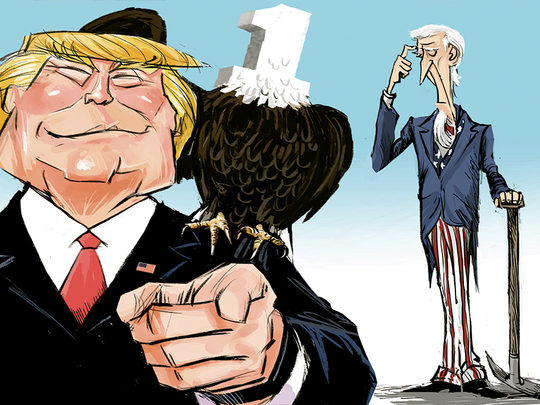
‘America First.”
I expect that’s the line that will get the most mention from United States President Donald Trump’s inaugural speech. He said it twice in a row, to emphasise a new role for America in the world: Not the leader of the free world, but an exceptionally large island between the Atlantic and Pacific oceans.
The phrase, of course, has ugly historical echoes: The America Firsters were the folks who thought America should let Adolf Hitler roll over Europe. The slogan emphatically rejects America’s Wilsonian century.
What followed was what Americans learned to expect from Trump on the campaign trail: Protectionism and tighter immigration to “protect our borders from the ravages of other countries making our products, stealing our companies, and destroying our jobs”. This was a campaign speech rather than the sort of vague and unifying address that we have come to expect from presidents transitioning from the campaign battlefield into management. It was, as the Federalist’s Sean Davis tweeted, “nothing short of a declaration of war against the ruling class”, an extended attack on basically everyone on the stage with him — including, of course, former president Barack Obama, whom he thanked for helping with the transition before, with the next breath, implicitly excoriating him for selling out his country to the interests of a corrupt elite.
I do not say that there is no place in presidential speeches for excoriating a self-dealing elite. I only say that the place for that is not the inauguration speech, after you have won an election while losing the popular vote. What America needed was a vision of America coming together to do something great. What Americans got was rhetoric about internal enemies.
Americans should not have expected anything else from Trump, whose entire campaign revolved around smashing the norms that govern American national elections. Nonetheless, it was an immense pity.
Americans are at a fragile moment in the history of their republic. Their political order is weaker than it has been at any time in living memory and possibly weaker than it has been at any time since 1860. There may be those who welcome the decline of the political order, because they consider it corrupt, ineffective and hostage to special interests. And, well it sort of is all those things. But I don’t welcome its decline, when no one is offering a better alternative to take its place. It is very easy to identify the flaws with an existing order, but much harder to put something better in its place, as the communists found out to the sorrow of millions of people.
Resolving disputes
Liberal democracy is an uneasy truce worked out after centuries of vicious religious wars in Europe, a compromise in which people agreed to commit to a peaceful process for resolving their most fundamental disputes, even if they hated the normative propositions that process ended up endorsing. Why did they do this? Because the alternative to living with sin is shooting the sinners. And being labelled a sinner. And being shot.
Starting with the people who protested the fact of Trump’s election, and culminating in the protesters who were on the streets of Washington on Friday throwing rocks and breaking windows, a whole lot of folks seem less and less willing to accept that process when it produces a result like President Trump. On Friday, I tweeted what seemed to me like a blandly unobjectionable statement: “Obama was my president. So is Trump. Because I’m an American, and the person who wins the US presidential election is my president.” I got a shocking amount of pushback. These developments are a grave threat to a precious thing: America’s ability to resolve political disputes without violence or state oppression.
The person best positioned to stop this worrying trend is President Donald Trump. The way he will do that is to tone down the angry rhetoric about betrayal at home and abroad, about “American carnage” and foreign ravagers — to try to speak to the whole country, rather than the minority who elected him.
He’s the person in the best position to do this; he’s not the person most likely to attempt it. I doubt it’s in his nature. It falls to the rest of the Americans to remember that it really is possible to, in Lincoln’s words, “meanly lose the last best hope of earth”. So if America takes one thing away from Trump’s speech, it should indeed be the vital mission of every citizen to put America first.
— Bloomberg
Megan McArdle is a Bloomberg View columnist writing on economics, business and public policy.








